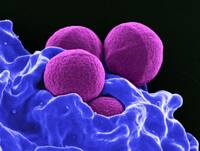MedicalResearch.com Interview with:
Michael Otto PhD
Senior Investigator
Laboratory of Bacteriology
Chief of the Pathogen Molecular Genetics Section
NIAID, NIH
Bethesda, MD 20814
MedicalResearch.com: What is the background for this study?
Response: Staphylococcus aureus is one the of the most important causes of infectious diseases worldwide. It is known mostly for causing skin infections in the community and as a hospital-associated pathogen. It is in fact the most frequent cause of infections patients acquire in the hospital when they are weakened by underlying diseases or immune-suppressing therapy. The type of infections Staph can cause in these situations are diverse – comprising bone, lung, and blood infections (sepsis) - and can be quite severe and often fatal.
Except for moderately severe skin infections that may not require antibiotic treatment, treatment of Staph infections is by antibiotics. S. aureus has naturally been very responsive to penicillin-type antibiotics, but already in the mid of the last century, resistance to penicillin spread worldwide. Then, methicillin was invented to overcome this resistance, but nowadays there also is considerable spread of methicillin-resistant strains (MRSA).
The current situation is difficult for two reasons:
- First, S. aureus has become increasingly resistant to many antibiotics, and
- Second, the alternatives to methicillin are often by far not as efficient as penicillin/methicillin against Staph.
Researchers have therefore been searching for alternatives to antibiotics to treat Staph infections. Unfortunately, vaccines that work against Staph have not yet been produced despite intensive efforts for decades. Other modern approaches of treatment, like virulence-targeted drugs or phages are still only at the early investigational level.
As with many diseases, an alternative to treatment is prevention. In the case of S. aureus, a type of preventative strategy that has often been proposed and tested is decolonization. This is based on the fact that ~ 1/3 of the population is naturally colonized with S. aureus (asymptomatically), and these colonized people have an increased risk of being infected. In other words, Staph infections stem from the Staph you carry on your body and which only under certain conditions causes infection. Thus, eliminating the colonizing Staph would reduce the risk for infection, which is the basis for Staph decolonization-based infection prevention strategies.
(more…)




